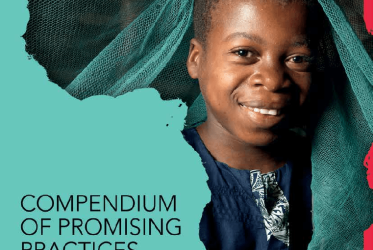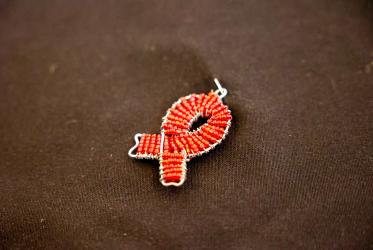Statement by the WCC Central Committee, Geneva, 30 August-6 September, 2006
Background
1. The AIDS pandemic presents one of the most significant challenges of our
times. AIDS causes 8000 deaths every day, has left 13 million children orphaned,
and exposes the perilous state of many countries' health care systems. AIDS threatens
the very existence of communities, cripples their ability to be sustainable and
productive, and shatters relationships due to the accompanying stigma and discrimination.
The situation poses a serious challenge to the leadership and capacity
of the churches to respond to this ongoing crisis. Since the first appearance of
the pandemic, 25 years ago, an estimated 65 million people have been infected
with HIV of whom 25 million have died. In 2005 alone an estimated 4.1 million
people became infected with HIV and an estimated 2.8 million people died
of AIDS-related illnesses. Today, the fastest growth in infection and the greatest
threat is to women and youth.
2. Five years after the 2001 United Nations General Assembly's special session
on HIV/AIDS, the evidence available underscores the great diversity among countries
and regions in implementing the response envisioned in the Declaration of
Commitment on HIV/AIDS. While certain countries have reached some key tar-
gets and milestones for 2005 as set out in the declaration, most countries have
failed to fulfill their pledges. A great deal of work still needs to be done - promises
made must be kept, millions of lives depend on this.
The ecumenical response, 1986-1997
3. The ecumenical movement has been steadfast in its commitment to respond
to HIV and AIDS and has promoted a holistic approach in addressing the pandemic.
As early as 1986 the Executive Committee of the World Council of Churches
(WCC) cautioned that: "
churches as institutions have been slow to speak and to act,
that many Christians have been quick to judge and condemn many of the people who have
fallen prey to the disease; and that through their silence, many churches share responsibility
for the fear that has swept our world more quickly than the virus itself," and called
on the churches to respond appropriately to the need for pastoral care, education
for prevention and social ministry.
4 Continuing in a similar vein the WCC Central Committee meeting in September
1996, urged the churches: "to promote, both in their own lives and in the wider society,
a climate of sensitive, factual and open exploration of the ethical issues posed by the pandemic
in accordance with their emphasis upon personal and communal responsibility the
churches can promote conditions - personal, cultural, and socio-economic - which support
persons in making responsible choices." Speaking about the living conditions of those
carrying the virus, the committee said: "People living with HIV/AIDS generally
encounter fear, rejection and discrimination
Because such reactions contradict the values
of the gospel, the churches are called to formulate and advocate a clear policy of non-discrimination
against persons living with HIV/AIDS."
Positive change
5. The churches have since continued in their struggle against HIV and AIDS
in all the regions of the world and there have been many positive developments.
The year 2000 witnessed the launch of the "Ecumenical Advocacy Alliance" (EAA)
of which the WCC is an active participant, which facilitates an active campaign
that includes fighting stigma and discrimination, promoting prevention, mobilizing
resources, advocating universal access to treatment, and promoting accountability
of governments and churches. The Alliance equips and ensures that churches
have the much-needed capacity to undertake this advocacy.
6. The "Ecumenical HIV/AIDS Initiative in Africa" (EHAIA) launched in 2002
aims at accompanying churches to become "HIV competent". It is making a critical
contribution to bringing about an inspired and rigorous theological understanding
of AIDS that includes appropriate training of clergy and laity as well as
enhancing the churches' capacity to engage in local action to overcome the challenges
that accompany HIV and AIDS. The churches in the Pacific, Asia, Latin
America, the Caribbean and in Eastern Europe have also made significant progress
in establishing initiatives and providing practical support on the ground during
this period.
7. A WCC-led effort, in association with the African Network of Religious Leaders
living with or personally affected by HIV and AIDS (ANERELA+), the Global
Network of People Living with HIV and AIDS (GNP+) and the International
Community of Women Living with HIV/AIDS (ICW), promotes greater and
more meaningful participation of people living with HIV and AIDS in the life
of the church. The campaign has encouraged and provided guidance to churches
to be more inclusive of people living with HIV and AIDS.
8. There are countless examples of the churches' response to the pandemic - in
prevention, care, treatment, confronting stigma, and theological reflection. Some
church leaders are speaking publicly about their successful initiatives, while identifying
and addressing the gaps in their response.
9. For the first time ever, the world possesses the means to reverse the global epidemic.
However, success will require complete willingness on the part of all actors
engaged in the global response to fulfill their potential, to adopt new ways of
working with each other and be committed to sustaining the response over the
long period.
The challenge
10. Nearly three decades into the AIDS pandemic and in spite of the progress
made in increasing global awareness and commitment to overcome HIV, the epidemic
continues to outstrip these efforts and remains a serious threat to humanity.
11. Churches have a unique and critical role to play in stemming the tide and
overcoming the pandemic. Health and support systems established and managed
by churches and Christian organizations provide some of the most significant
grassroots care of people living with or affected by HIV or AIDS. But even more,
efforts to overcome stigma and discrimination - which have been fuelled by attitudes
within religious communities - are essential to share accurate information
about prevention and treatment.
12. The situation calls for churches in collaboration with other organizations and
Christians to reflect abundant love in all their responses to HIV and AIDS. These
responses have to be tempered by compassion and qualified by competence. The
bottom line is to meet the needs of the most vulnerable in the community. The
quality and quantity of the response from the Christian community should reflect
the levels of commitment that are demanded of Christians as followers of Jesus
Christ.
13. The churches need to provide the leadership to prevent and to overcome HIV
and AIDS, and recognize people living with the virus as precious members of the
community. Sound policies have to be put in place with tangible actions, where
treatment, care and support for all who are affected are easily accessible. Attention
should be given to relationships and family life - including the life-saving responsibility
of all to protect themselves through practising abstinence outside of mar-
riage, fidelity in marriage and a healthy way of life, including overcoming drug
abuse.
14. Educational efforts must be supported which promote sexual responsibility
and help protecting people from non-consensual sex and sexual violence. Additionally,
women and girls must be guaranteed access to reproductive health care. The
churches should promote life, by providing comprehensive and evidence-based
information on preventing transmission of the virus, ensuring access to voluntary
and confidential counselling and testing, and universal access to care and treatment.
Raising the voice' of leaders
15. Aware of the value of advocacy, church leaders should use it to influence society
to bring about policy changes. Leaders must challenge themselves, their own
institutions and society to face the issue in a forthright manner, breaking the
silence that fuels fear, judgment, stigma and discrimination. Leaders must support
initiatives that will guide people to make responsible choices to protect them
from HIV infection, reduce vulnerabilities to infection, and encourage supportive
communities where people can receive accurate information and treatment.
16. Religious leaders must begin by examining their own behaviour, attitudes
and actions that may have been complicit in the marginalization and stigmatization
of people living with HIV and AIDS rather than the full inclusion of people
who are living with and affected by the virus. The Bible and the example of
Jesus always lead us to stand alongside someone we might prefer to avoid. Jesus
said, "There God is present". We are compelled to stand with those who are suffering,
to have mercy rather than to marginalize, to empower rather than to stigmatize.
Giving a face' to the challenge
17. Churches have promoted and should continue to promote greater and more
meaningful involvement and participation of people living with HIV and AIDS,
whilst adopting inclusive workplace policies and sustainable methods of working
with networks of HIV-positive people. Given the fact that this pandemic is
driven by poverty and gender issues, it is imperative that women and girls be
included in planning and implementing policies and programmes that directly
affect them. Efforts must be made to ensure that HIV-positive people are part of
a team of resource persons whose task is to empower churches to deal with the
issues in a more holistic and inclusive manner. Given the rising rates of infection
among youth, young people need also to be involved in crafting messages and
programmes to address prevention and support.
18. In a very real sense, we are all living with HIV and AIDS. We separate ourselves
from God and God's love if we speak of "them" and "us" when we speak of
people living with HIV and AIDS or those who are most vulnerable to infection.
Providing hands' to the issue
19. The churches must be the able and willing hands of God, reflecting a compassionate,
engaging and competent church. There should also be a commitment
by the churches to mainstream responses to HIV and AIDS, to ensure that society
is made less vulnerable to the disease and also benefits from new developments
made in combating HIV - new developments in prevention, treatment, care and
support. Access to anti-retroviral treatment must be promoted for all who need
it. The benefits of science and medications should be made available and affordable
to all communities, especially those that are marginalized and isolated.
20. As an important part of the learning process, churches should encourage open
and inclusive discussions on issues related to sexuality, gender-based violence and
intravenous drug use, so that individuals and communities are empowered to be
less vulnerable to HIV. The need to promote understanding of the issue from both
a theological and ethical context is important and necessary, so that the response
is grounded in clear thinking, focused on providing care and support for those
infected by HIV and AIDS as well as preventing further spread of the virus.
21. Romans 8:35 states: "Who can separate us from the love of Christ?" Can HIV
come between Christ and us? If someone attempts to come between HIV positive
people and God, does he or she come from God? Does the congregation make
the person living with HIV feel welcome, loved and part of the same body? If the
congregation perpetuates exclusion, avoidance, stigmatization or persecution is
it not placing a barrier between God and God's children?
22. The majority of the 40 million people living with HIV have no access to
treatment. Faith-based communities have a responsibility to advocate that antiretroviral
treatments as well as treatment for other opportunistic infections be
made available and accessible to all.
23. There are billions of people in the world who, though not infected with HIV,
continue to remain ill-informed and thus are not equipped to prevent this eminently
preventable disease. This makes it obligatory to engage in and work to
overcome the viruses of ignorance, silence and fear. Neglecting to do so amounts
to placing barriers between God and God's children.
The need to act
24. Failure to strengthen urgently the response to AIDS will mean that the world
will achieve neither the 2010 target of the Declaration of Commitment nor
Millennium Development Goal 6. And without major progress in tackling AIDS,
global efforts to achieve the Millennium Development Goals of reducing poverty,
hunger and childhood mortality will similarly fall short of agreed targets.
Countries in all the regions of the world whose development has already suffered
because of AIDS will continue to weaken, with potential threat to social stability
and national security. But the tragic reality is that millions continue to die
each year.
25. The Central Committee of the World Council of Churches meeting in Geneva,
Switzerland, 30 August-6 September, 2006:
a) Acknowledges that while after 25 years of the first appearance of AIDS much
progress has been made in terms of global awareness and promises to overcome
HIV, the pandemic continues to outstrip these efforts and remains a
serious threat to humanity;
b) Acknowledges also that without major progress in stopping AIDS, global
efforts to achieve the Millennium Development Goals of reducing poverty,
hunger and childhood mortality will continue to weaken, potentially
threatening social stability and national sustainability;
c) Further acknowledges that while the churches have been on the front line of
care and support for people affected by the pandemic, many of us have also
been complicit in stigmatizing and marginalizing people living with HIV
and AIDS by our silence, our attitudes, our words and our deeds;
d) Appreciates the leadership of the African Network of Religious Leaders living
with and personally affected by HIV/AIDS (ANERELA+), the Global
Network of People living with HIV/AIDS (GNP+) and the International
Community of Women living with HIV/AIDS (ICW) in promoting the
greater participation of people living with HIV and AIDS in the life of the
church; and the convening of the XVI International AIDS Conference on
18 August in Toronto, Canada by UNAIDS that called for a long-term
sustained response to AIDS during the next 25 years and beyond;
e) Encourages the churches to continue to play a critical role in overcoming
the pandemic through responses that are tempered by compassion and qualified
by competence; this includes providing comprehensive and evidencebased
information on prevention of HIV transmission and addressing the
links between gender inequity, poverty and HIV and AIDS;
f) Encourages also the leadership of the churches to exercise their role as advocates
for just policies and to hold governments accountable for their promises;
g) Calls on the G8 governments to adhere to their promises of funding and
response to reach universal access to treatment, care and support by 2010;
and on the private sector, especially pharmaceutical companies, to invest
in needed research and development to respond to HIV (e.g. pediatric
dosages and diagnostics) and to ensure that their drugs for treating HIV
are available at low prices in low and middle-income countries;
h) Renews its call on churches and Christians to promote greater and more
meaningful involvement and participation of the people living with HIV
and AIDS and to promote and adopt inclusive workplace policies and innovative
and sustainable methods of working with networks of HIV-positive
people; and to promote and share deeper theological and ethical reflection
on HIV and AIDS, and to promote the acceptance by the churches of persons
living with HIV and AIDS;
i) Urges churches and their related organizations to promote and share deeper
theological and ethical reflection on HIV and AIDS;
j) Appeals to the churches to commit themselves to mainstream the response
to HIV and AIDS, ensuring that people are made less vulnerable and benefit
from new developments in prevention and treatment and advocating
for universal access to anti-retroviral treatment; and to promote open and
inclusive discussions on issues related to sexuality, gender-based violence
and intravenous drug use to empower individuals and communities to be
less vulnerable to HIV;
k) Encourages churches and church leaders to include women and young people
in developing and implementing programmes and policies on HIV and AIDS;
l) Reiterates the need to strengthen the capacity of the churches and civil society
organizations and networks by providing adequate human and material
resources to monitor and implement the effectiveness of local and national
efforts to reverse the trend of this global pandemic, including strengthening
support for existing effective ecumenical initiatives like the WCC's Ecumenical
HIV/AIDS Initiative in Africa (EHAIA);
m) Considers the convening of a church leaders' summit no later than 2008, to
be accompanied by a youth summit, to examine our collective response to
the pandemic, learn from better practices, and shape the agenda for the
ecumenical response to this crisis;
n) Calls for ongoing ecumenical reflection on those aspects of the church's
response to HIV and AIDS about which there is continual disagreement.
This would include the nature of the church's response to those who, contrary
to the church's witness, engage in high-risk sexual activity or drug
use, including the appropriate means of prevention.





